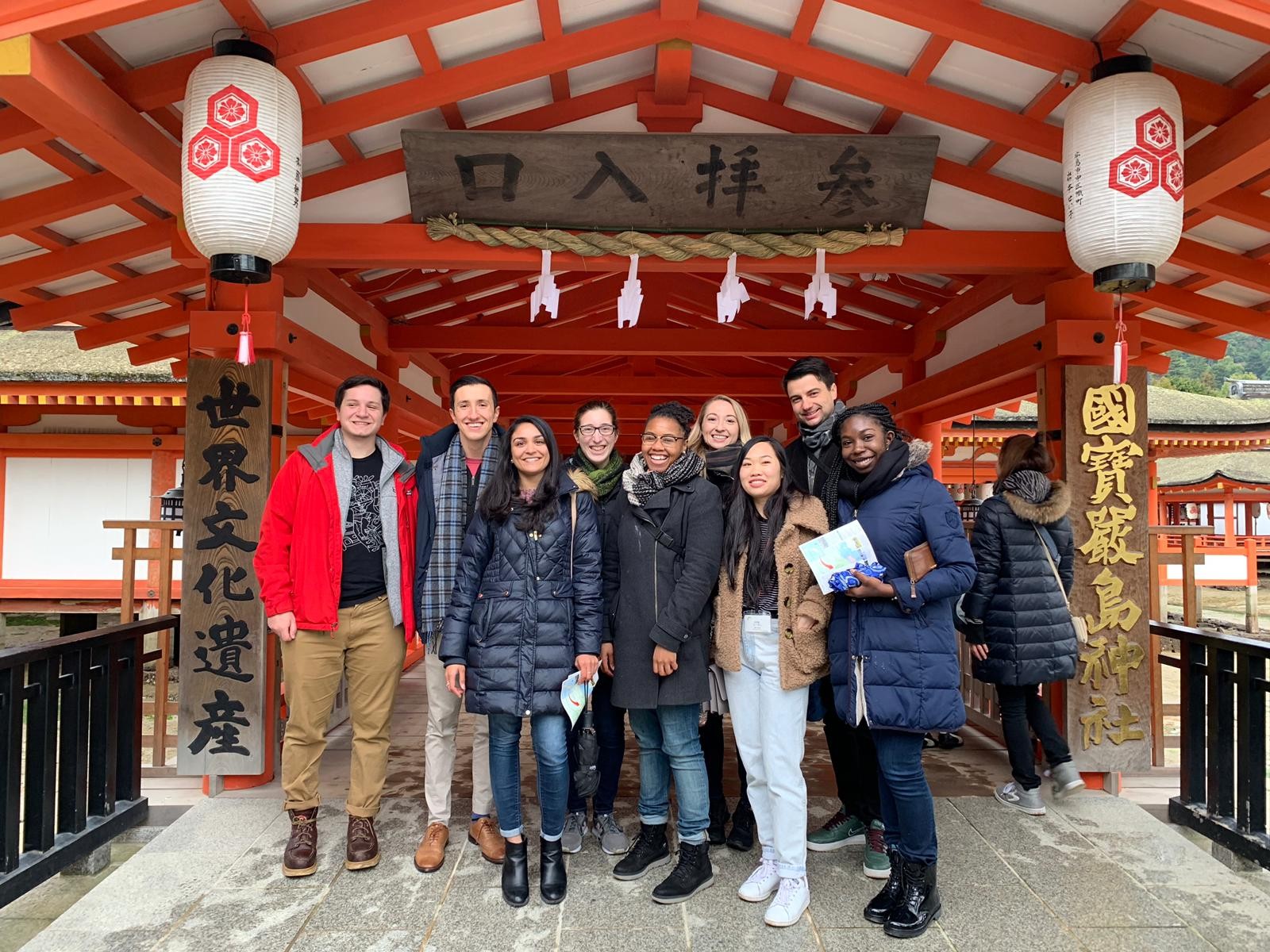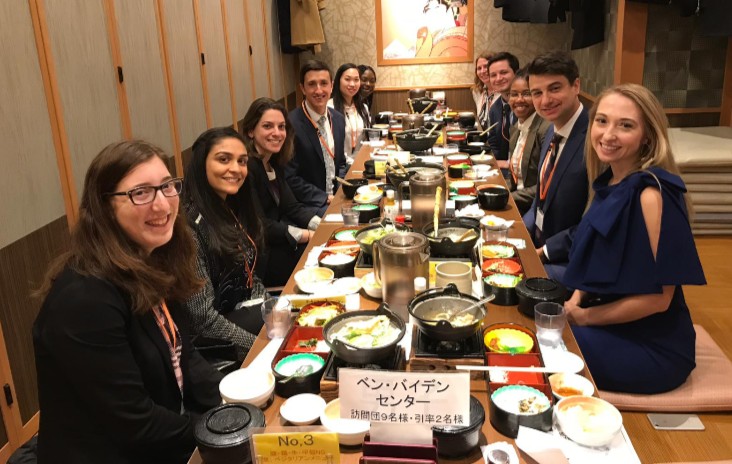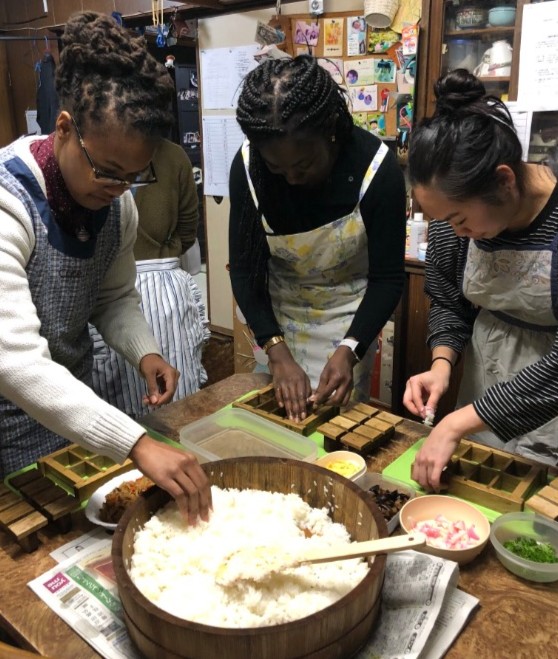K
iana Murphy and Stephen Damianos applied for the Penn Biden Center’s Kakehashi Project for different reasons, and their paths at Penn might never have crossed if they hadn’t spent eight days traveling through Japan together.
She’s a fourth-year graduate student in the English Department whose interest in comics and science fiction motivated her to see the mecca of manga. He’s a senior political science major and a passionate advocate for refugees who was curious about Japan’s hands-off stance on Asian refugees.
They joined seven other Penn students—two graduate, five undergraduate—for the Kakehashi Project, a cultural exchange program sponsored by the Japanese government. Students applied and were selected by the Penn Biden Center for Diplomacy and Global Engagement, in partnership with the School of Arts and Sciences.
After their whirlwind tour of Japan—from cities to the countryside, Buddhist temples to car factories—the students returned to Philadelphia as close friends.
“We were all kind of strangers going in, which was not how we left,” Damianos says. “It did not feel like eight days and the relationships did not feel like they were eight days old.”
They also left Japan with a deep appreciation of the country’s cultural rituals and the value of savoring what’s happening in the moment, whether a tea ceremony or a meal prepared together. That was embodied by a phrase they heard again and again: “Ichi-go, Ichi-e.”
“It translates to something like, ‘The moment we are sharing we will not have again,’ and I think that that mindset kind of permeated everything in our Japanese trip,” Damianos says.
Every interaction, every event, was intentional and meaningful—a sharp contrast to the breakneck pace of life at home.
“That idea of treasuring a moment as fleeting, and of trying to pull from it everything you can to enrich yourself and those around you, is incredibly valuable and maybe even more important than anything I’ve learned in class here,” Damianos says. “These are the types of lessons that you don’t get from a textbook or from a lecture.”
The other undergraduates on the trip were Brianna Arscott Grant, Ruhy Patel, John Macri, Jackie Bein, and Susan Chor. Roksana Filipowska and Julio Erdos were the other graduate students.
The trip included time in Tokyo, where students toured the Japanese Diet and other government buildings. They also visited the Hiroshima Peace Memorial Museum, the Mazda museum and factory, and Buddhist and Shinto temples.
They participated in a traditional Japanese tea ceremony, and each stayed the night in the home of a rural Japanese family. At the Hiroshima memorial, they spent time with Kiyomi Komo, who survived the 1945 atomic bombing of the city by the United States, who implored them to help ensure nuclear weapons are never again used.
Bein, a history major, says it’s something that will always stay with her. “Among the many forms of cultural exchange that took place throughout the trip, our visit to Hiroshima was an important reckoning with the history of the United States-Japanese relationship,” she says.
Being forced to confront what happened also inspired Murphy to think about how she can bring a critical sense of empathy and care toward the historical past into the class she’s teaching this spring, Black to the Future: Race as Science Fiction. “I’m hoping to hold my students accountable to knowing a much broader history than this digital age that we’re living in now, where everything moves so fast,” she says.
The tea ceremony and the chance to prepare and eat meals with their Japanese hosts were other highlights for the students. Murphy made sushi with her host family.
“Our Japanese host mom kept saying, ‘It’s a canvas, the sushi is a canvas.’ She wanted us to try some of the vegetable assortments, she wanted us to be creative,” she says. “There was this sense of care—actually getting our hands dirty, feeling the rice, feeling the stickiness, she was encouraging us to taste it as we went along.
“Then, being able to eat together and give collective thanks before and after every meal...it was a kind of ritual in a way that I’m not really used to. I found it very beautiful.”
The visits were challenging, since the students speak almost no Japanese and their host families spoke little English. But with heavy reliance on phrasebooks and Google Translate, the language barrier fell away. Damianos, who stayed on a rice farm, says he had a deep conversation about a subject he wasn’t expecting: climate change.
“My host dad took me out to his farm and showed me some of the leaves that were withering on his trees and then said to me, ‘How can your president not believe in climate change when my trees are dying?’” he says. “It was really powerful for me to see that these problems that we have are not just siloed here, but they’re happening all over the world.”
A previous group of Wharton School students had participated in the Kakehashi Project in 2017, focusing on business and industry. To prepare for this trip, the Penn Biden Center hosted three sessions for the students, each covering a different aspect of diplomacy and of Japan and its culture.
Students learned about the history of the U.S.-Japan relationship from Frederick R. Dickinson, a professor of Japanese history, co-director of the Lauder Institute of Management & International Studies, and deputy director of the Penn Forum on Japan. Ayako Kano, a professor of Japanese literature, performance, and gender studies in the East Asian Languages and Civilizations Department in the School of Arts and Sciences, also talked to the group about gender expectations and Japanese customs, particularly involving women in the workplace.
Carlyn Reichel, the Penn Biden Center communications director, addressed diplomatic communications between the two countries, focusing on a handful of important moments. She discussed President Barack Obama’s speech at Hiroshima in 2016—the first visit by a U.S. president to the site—and Japanese Prime Minister Shinzo Abe’s subsequent visit to Pearl Harbor later that year.
For the third and final pre-trip session, in early December, the group traveled to Washington, D.C., to visit the Penn Biden Center and discuss the ins and outs of diplomacy. It was led by Ambassador Kazutoshi Aikawa, deputy chief of mission at the Japanese Embassy, and Antony Blinken, the Penn Biden Center’s managing director. Afterward, the Japanese Embassy hosted the group for a small dinner.
Reichel and Ariana Berengaut, the center’s director of programs, partnerships, and strategic planning, accompanied the students on the trip.
Murphy and Damianos say the group felt well-prepared for the experience because of the Penn Biden Center sessions. Murphy was especially intrigued by her conversations in Washington with diplomats and others in the foreign service.
“As someone who is not studying relations, kind of on the outside looking in, it was amazing to listen to the trajectory of their career paths,” she says. “I thought, ‘What would it be like for me, as someone who’s doing literary studies and also interested in cultural exchanges, to actually do work like this?’”
The students returned just in time for the beginning of spring classes—the final semester for the six undergraduates.
“As I approach the end of my time at Penn, where I’ve spent a lot of time learning about different cultures secondhand in history and language classes, this trip re-affirmed for me that traveling and engaging with the community is truly the best way to learn about the world,” Bein says. “I hope to continue to seek out opportunities to travel abroad and think about the political issues and cultural implications while doing so.”
Damianos, who’s headed to Cambridge University next fall as a Truman Scholar, said the bond the group forged was meaningful. “For me, it was intensely refreshing to, in the middle of my senior year, be surrounded by new people who are interested in different things and who are passionate about the world,” he says.
The group plans to keep meeting for the rest of the academic year, perhaps for sushi, but certainly to stay in touch. There’s also talk of taking a trip back to D.C. for the annual Cherry Blossom Festival.
“We really want to stay involved with the culture, as well as with each other,” Damianos says.
Photos courtesy of Kiana Murphy.










